Sandy Bridge Memory Scaling: Choosing the Best DDR3
by Jared Bell on July 25, 2011 1:55 AM EST7-Zip
Many people are moving over to 7-Zip for their compression/decompression needs. 7-Zip is not only free and open-source, but it also has a built in benchmark for measuring system performance using the LZMA compression/decompression method. Keep in mind that these tests are ran in memory and bypass any potential disk bottlenecks. The compression routines in particular can put a heavy load on the memory subsystem, as many MB worth of data is scanned for patterns that allow the compression to take place. In a sense, data compression is one of the best real-world tests for memory performance.
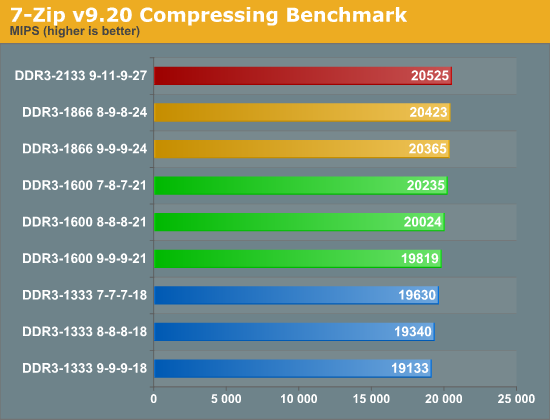
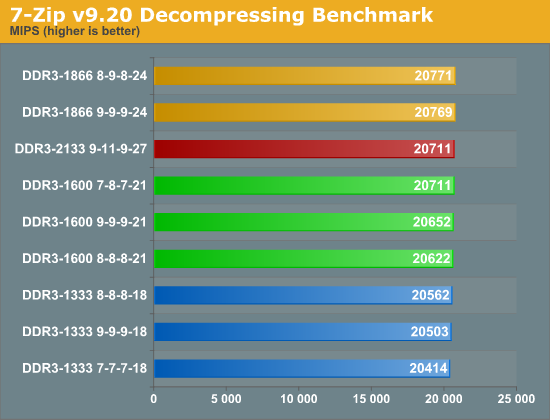
The compression test shows a linear performance increase with a ~7% variance between the fastest and slowest. If you do a fair amount of compressing, you could potentially save some time in the long run by using faster memory. This, of course, is assuming you're not bottlenecked elsewhere such as in your I/O or CPU performance. The decompression test isn’t affected by faster memory in the same way, as there’s no pattern recognition going on; it’s simply expanding the already found patterns into the original files. With less than 2% separating the range, it's unlikely to make much of a difference if you’re primarily decompressing files.
x264 HD Benchmark
The x264 HD Benchmark measures how fast your system can encode a short HD-quality video clip into a high quality H.264 video file. There are two separate passes performed and compared. Multiple passes are generally used to ensure the highest quality video output, and the first pass tends to be more I/O bound while the second pass is typically constrained by CPU performance.
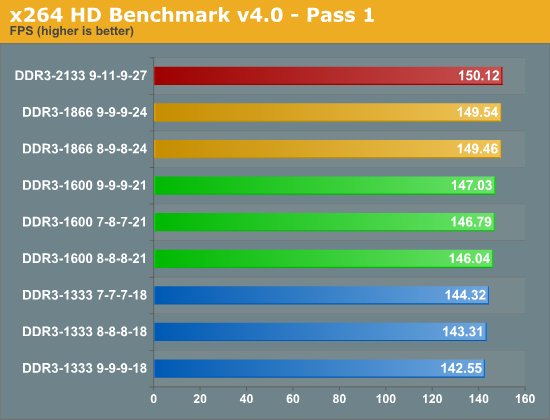
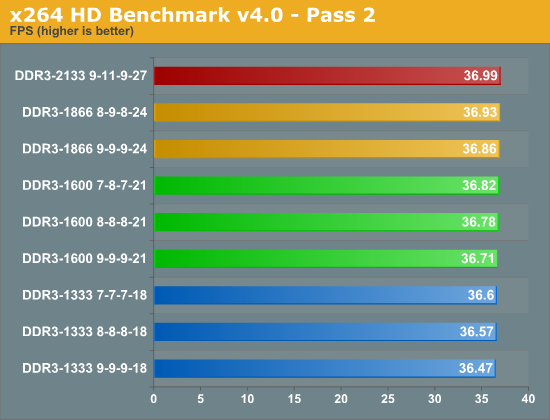
While not a huge spread, we do see a difference of 5% from the fastest to the slowest in the first pass. The second pass, however, shows a less than 2% gain. If encoding is one of your systems primary tasks, it's possible that having faster memory could pay off over time, but a faster CPU will be far more beneficial.
Cinebench 11.5
The Cinebench CPU test scenario uses all of your system's processing power to render a photorealistic 3D scene containing approximately 2,000 objects and nearly 300,000 polygons. This scene makes use of various algorithms to stress all available processor cores, but how does memory speed come into play?
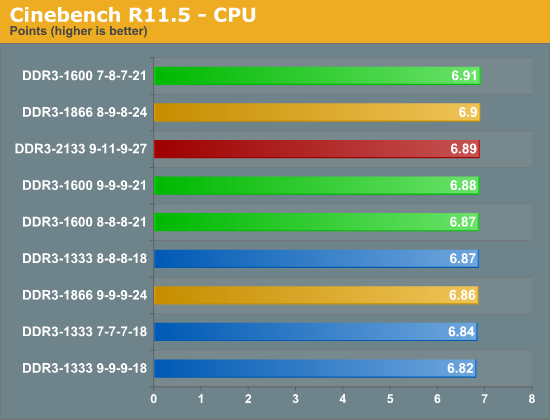
Apparently not much in this benchmark. We're looking at a less than 2% difference from the fastest to the slowest. It's possible that CAS latency is more important for this type of load, but due to the extremely small variance, I don't believe that statement is conclusive. Overall, even a single CPU bin would be enough to close the gap between the fastest and slowest memory we tested.










76 Comments
View All Comments
Rick83 - Monday, July 25, 2011 - link
Fancy heat spreaders are the worst that has ever happened to RAM.It gets worse when you have to pay more to get rid of it, as with the new low profile vengeance series from corsair.
Memory doesn't usually get that hot anyway, and the large heat spreaders impede airflow between the modules in fully populated setups, as well as limit what size your cooler can be, occasionally forcing you to get one of those water-cooler-in-a-box things which incur massive extra costs.
The only reason I don't want to have completely naked memory, is that the heat spreader gives the RAM some ESD protection, which is actually useful.
JoJoman88 - Monday, July 25, 2011 - link
The review just made your post the truest of them all jabber!Spacecomber - Monday, July 25, 2011 - link
In the past, one reason to get faster rated memory is that you eventually would see a migration of what was the standard memory module to something running on a faster bus speed. I'm not sure if that really holds true, anymore. It seems that these days you are more likely to see the adoption of a completely new type of memory, rather than an existing standard sticking around long enough for the minimum required memory speeds it is based on to go up.geofelt - Monday, July 25, 2011 - link
One of the price differentiators is the heat spreaders.Apart from the aesthetics, where is the value of fancy heat spreaders? Can it be measured?
Seems to me that they are mostly marketing gimmicks, excepting perhaps for those used on overclocking competitions.
I would like to see some sort of a study to determine the value of heat spreaders.
MrSpadge - Wednesday, July 27, 2011 - link
Short answer: nothing.MrS
BobDavid - Monday, July 25, 2011 - link
see subjectJarredWalton - Monday, July 25, 2011 - link
See the conclusion; we already did a look at that (with HD 3000 and Llano).http://www.anandtech.com/show/4476/amd-a83850-revi...
LoneWolf15 - Monday, July 25, 2011 - link
Ivy Bridge will be out next year. There is a reasonable chance it could have a bump in memory bandwidth. Buy RAM at one or two multipliers above what you need now, and when the upgrade comes along, you won't be wishing for new RAM.DDR3 is so cheap right now, it's worth planning ahead.
dman - Monday, July 25, 2011 - link
I've been looking for a review like this for a while, was a good read even if it didn't come as a huge surprise. I'm definitely interested in the AMD platform results if/when those are available.SteveSweetz - Monday, July 25, 2011 - link
I was disappointed to see this article lacked the detail (and quantity) of the gaming tests versus it's predecessor on AnandTech: http://www.anandtech.com/show/2792/10That article showed that memory frequency and latency changes had a greater impact in some games than others, and that in most cases the memory also had a greater impact on the minimum framerate (an important consideration) than average framerate.
Also disappointing to see no CAS6 sticks tested here. Particularly because 2GB 1600MHz CAS6 were relatively common at one point, but now, for whatever reason, G.Skill is the only company that still makes them. It'd be interesting to see if that's a meaningful exclusive. The previous article showed CAS latency being more important than frequency in some cases.